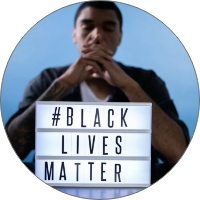Knowledge For Us By Us
Our Values

Excellence

Social Justice

Cultivating Care
MEET THE TEAM BEHIND
Interpretive Research Institute
Gina E. Miranda Samuels, PHD, MSW
Gina Miranda Samuels (she/hers) is a Professor at the Crown School of Social Work, Policy and Practice and the Faculty Director of the Center for the Study of Race, Politics and Culture at the University of Chicago. Dr. Miranda Samuels is an award-winning teacher, mentor, and researcher. She brings over 25 years of experience and expertise in using critical interpretive methods to explore displacement, belonging and healing among people who have experienced adoption, transracial adoption, multiraciality, foster care, or home loss. As a black, mixed-race person, transracially adopted from foster care she brings lived and living expertise to these topics. Dr. Miranda Samuels created, with her students, a model of methods training using immersive practices and peer-led classroom structures. She is one of the leading voices in social work on epistemic injustice in social work science, interpretive methods in child welfare and transracial adoption, and is frequently invited to give keynote addresses, trainings, and workshops related to her scholarly expertise. Miranda Samuels is the author of numerous monographs and journal articles and has presented her scholarship throughout the U.S. and abroad. Her work has been used in public testimony to the U.S. House of Representatives, and has informed public policy, practice in child welfare, transracial adoption, and housing instability among youth. She was noted as one of the top 14 most impactful African American scholars in Social Work, and among the top 2% cited authors worldwide by Elsevier Press. Dr. Miranda Samuels lives in Chicago and when she can, resides at her lake house in the woods of North Carolina with her husband and dog.
Kelly Faye Jackson
Dr. Kelly Faye Jackson (she/her/hers) is an Associate Professor in the School of Social Work at Arizona State University. She earned her BSW from Cornell University, MSW from the University at Albany SUNY, and PhD from the University at Buffalo SUNY. Dr. Jackson’s research is grounded in Black Feminism, Womanism and Critical (Mixed)Race theories. She utilizes critical narrative and visual participatory methods to examine the identity development and overall wellbeing of persons of mixed-race heritage. In addition, Dr. Jackson developed a new critical methodology known as Black Feminist Polyethnography to investigate gendered anti-Black racism in academia. She is the co-creator and lead instructor of an interdisciplinary critical qualitative methods course that teaches doctoral students how to develop meaningful research that matters in the lives of those who experience injustice. Dr. Jackson is co-author of the book Multiracial Cultural Attunement (Jackson & Samuels, 2019), which introduces a critical, anti-racist model of practice for helping professionals serving mixed-race individuals and families. It is from the lens of cultural attunement that she approaches her teaching, mentorship, and service work, including her recent appointment on the editorial board of Affilia, the only peer-reviewed, scholarly social work journal that centers feminist voices, underrepresented in mainstream social work journals. Dr. Jackson identifies as a mixed Black (and white) cisgender woman and resides with her daughter and pup in Phoenix, Arizona – the ancestral homelands of the Akimel O’odham, Pee Posh, Quechan, and Tohono O’odham peoples.

